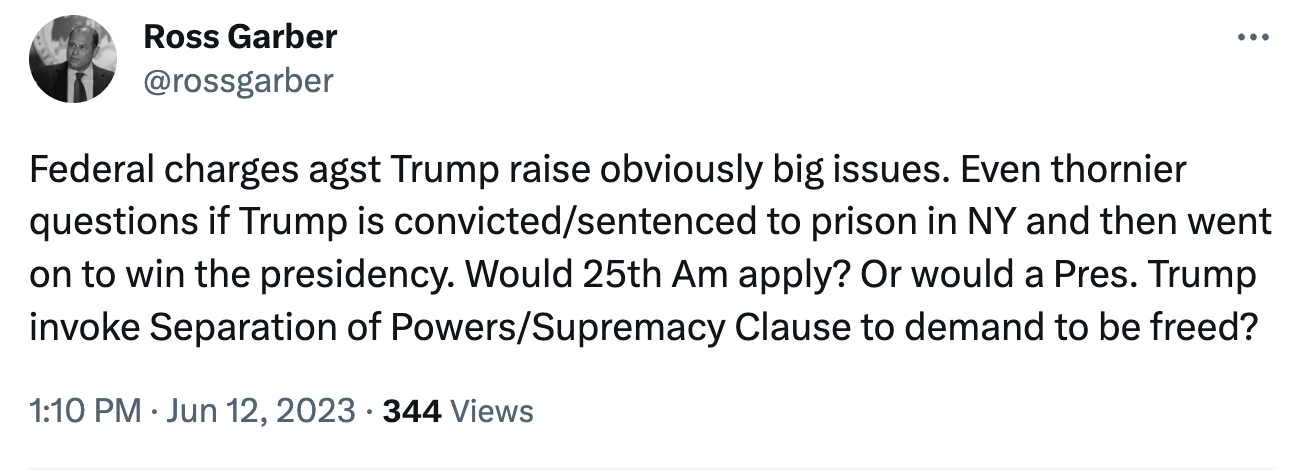Running the country from Trump's jail cell, Chick-fil-A and the 'home ownership scam'
Red Meat For Mushy Moderates

Try as I might, I haven’t been able to shake the story of the first federal criminal indictment of a former U.S. president. Note to self and readers: the first state indictment of a former U.S. president was only a little more than two months ago.
Trump’s post-presidency has been pretty much the same as his presidency itself — one daily drama after another; an endless array of breaking-news cable chyrons scrolling past us; lies issuing forth from his mouth at a pace that makes the Olympian heads of the fact checkers spin in befuddlement.
The indictment itself (click here to read the full text via Politico) is compelling — much more damning than Alvin Bragg’s recent indictment in Manhattan. There is much detail and even some photographs. I have never seen images before in an indictment, and I’ve read a lot of them as a journalist.
As Politico says, there are “31 counts of ‘willful retention’ of classified records, as well as several counts related to his alleged effort to obstruct the investigation.” There are 37 felony counts out of 38 total charges. It is almost impossible to imagine a scenario in which Trump, who is expected to be arraigned this afternoon in Miami, is acquitted of all charges.
We’ve been told this South Florida federal court is known as the “rocket docket.” So it is highly likely, if the trial proceeds expeditiously, that we will have a convicted felon running for president who cannot even vote for himself. In a worst-case scenario, he will be directing the campaign from a gold-plated jail cell with a chandelier (okay, I’m only kidding about the chandelier).
And a conviction raises all sorts of other questions if Trump actually wins the election, as Ross Garber wrote on Twitter. Garber teaches at Tulane, and is an expert on government investigations and impeachment, having defended four governors in impeachment trials, including Connecticut’s own John Rowland.
So if Trump is sentenced and incarcerated after (or even before) his election, would he be sworn in at a state or federal prison? He obviously could not perform his duties. How, for example, could he receive his daily top-secret briefing from his national security advisor? In the event of a national security emergency, how could he meet securely with the Joint Chiefs of Staff? And what would the State of the Union address would look like? Would Trump be allowed to don one of his blue suits with the ridiculously long red necktie?
Would the cabinet invoke the 25th Amendment Section 4 which, in effect, permits the vice president and the cabinet to replace the president if he is unable to discharge his duties? Presumably, this would result in the elevation of his vice president to chief executive. But what if the veep refuses the office out of loyalty to the man who selected him or her as second-in-line? Would that make Speaker Kevin McCarthy president — that is, if McCarthy is still speaker in January 2025?
Or, as former Obama administration attorney Eric Columbus has suggested, Trump’s attorneys could file a writ of habeas corpus to get their client released on the grounds that his continued detention is incompatible with Article II of the Constitution, which addresses the executive branch and the powers and obligations of the presidency. In other words, the argument would be the reverse of the 25th Amendment: that his imprisonment actually prevents Trump from discharging the duties he was duly elected to perform.
So while some legal analysts are calling this case the “trial of the century,” I find myself focused more on its fascinating implications than on the nature of allegations themselves. Meanwhile, if I have nothing better to do, I will be tuning in this afternoon for the arraignment. Watch for the actions of the federal judge assigned to the case, Aileen Cannon, a Trump appointee and apparent partisan who was widely criticized for decisions she made in the early phases of the case.
Chick-fil-A: Not on Sundays, not on the Thruway
An interesting mini-controversy has sprung up around a Chick-fil-A, and it has nothing to do with the company’s support for organizations opposing same-sex marriage.
The company has been awarded a contract to open restaurants on several rebuilt service areas along the New York State Thruway. At first glance, it’s a great idea, seeing as the chicken chain is one of the most popular fast food brands in the nation.
I’m sure there will be some who won’t eat at Chick-fil-A’s Thruway locations because of the political views of the Christian family that owns the company. That’s their right, just as the Cathy family, founders of Chick-fil-A, has a right to support the causes that align with its values.
But there is another problem that speaks to Chick-fil-A’s ability to serve motorists effectively. All of its nearly 3,000 restaurants are closed on Sunday, a busy travel day for the Thruway, but also the Sabbath for Christians.
The terrific Albany Times Union opinion writer Chris Churchill pointed this out in a recent column and was immediately attacked on Twitter for having a bias against Christians (though it looks like the worst comments have been deleted).
No, Churchill is questioning the appropriateness of Chick-fil-A’s policy as a practical matter. At least 250 million vehicles travel more than 8 billion miles per year on the Thruway, with Sunday being one of the busiest for tourists and state residents returning from the weekend. I know that firsthand from my occasional journeys on I-90. Not to mix metaphors, but methinks the Chick-fil-A snowflakes need to grow a thicker skin.
The home ownership ‘scam’?
As I told Paul Pacelli on my WICC radio appearance yesterday, I like to read things that challenge my own assumptions about the world. Like many of you, I’ve long proceeded on the premise that homeownership has a positive effect on society.
But as this piece in the left-leaning magazine The Nation points out, there is very little evidence that homeowners make for better citizens. Moreover, home ownership is, in the words of the author, “a uniquely American scam.” Well not really, but …
Home ownership itself isn’t uniquely American, yet as the piece points out, “the emphasis Americans place on homeownership sets us apart from many other nations of the world,” according to Mel Martinez, who was President George W. Bush’s secretary of Housing and Urban Development (HUD).
The idea that homeownership makes for better citizens seems to be only rationale for the home-mortgage interest deduction. But I’m beginning to think the real reason is that the real estate industry loves it. After all, they’re the first to complain loudly whenever eliminating the HMID is mentioned.
Is home ownership a solid investment? Maybe, though if you bought before the housing crash of 2008 or tried to sell afterwards, you might not think so. I would argue that the HMID distorts the housing market and should be eliminated. The extra revenue could be used either to pay down the national debt or to lower marginal tax rates for everyone, even renters. There, I said it.





